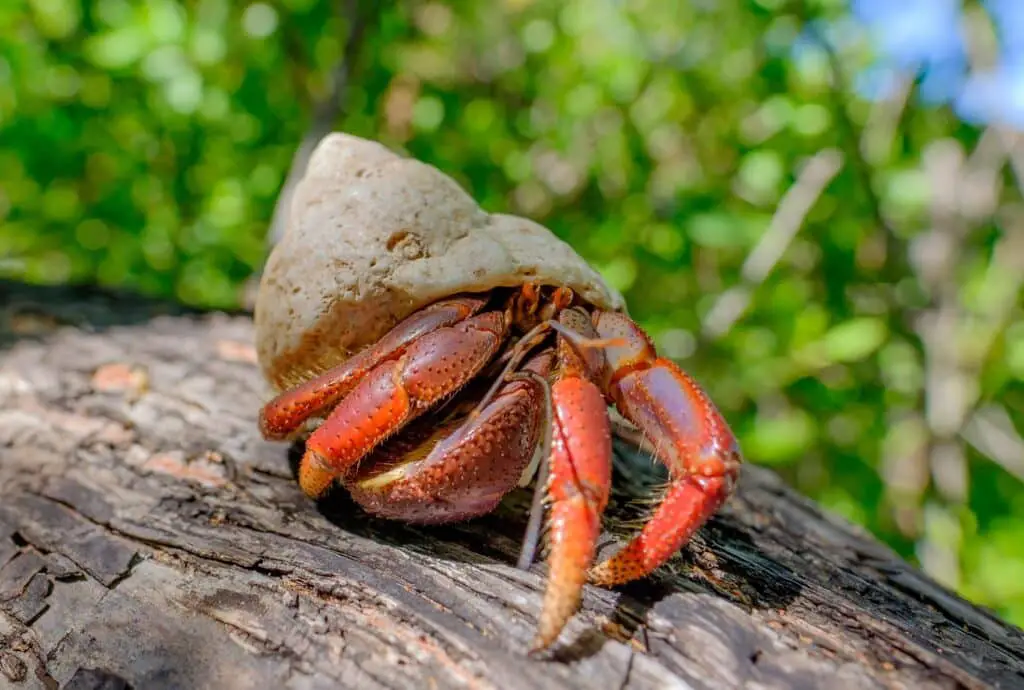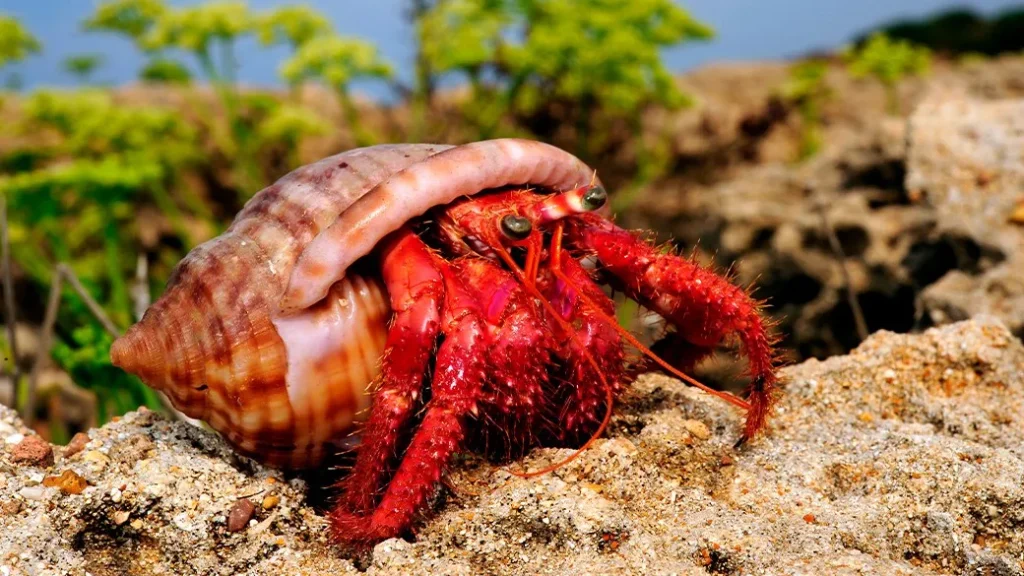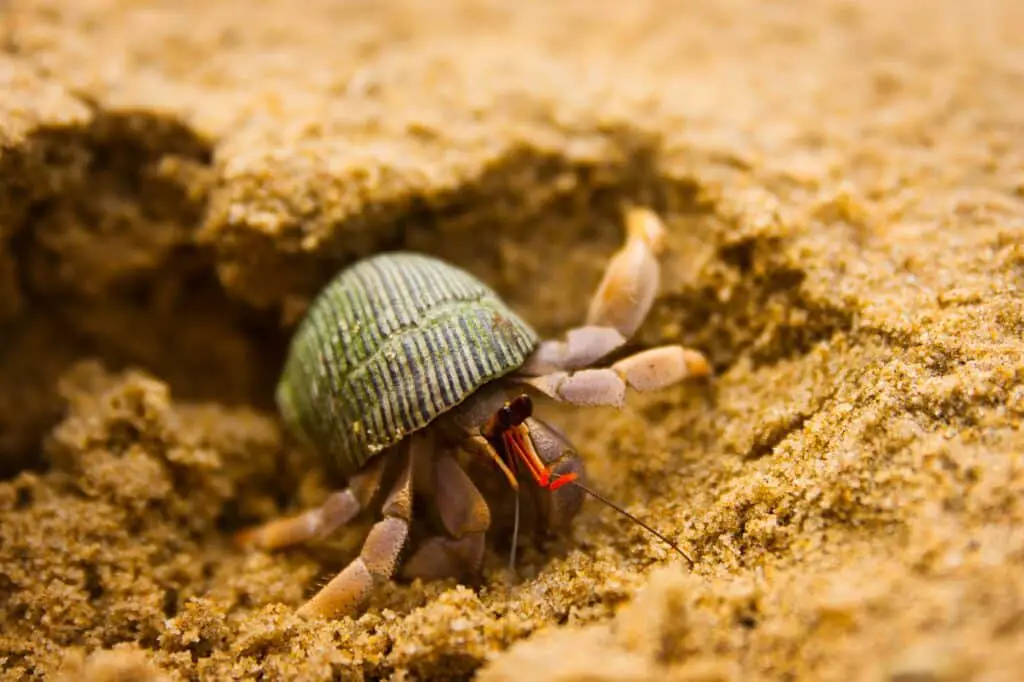Can Hermit Crabs Eat Grapes

Introduction
Can Hermit Crabs Eat Grapes: Hermit crabs are intriguing creatures that have captivated the curiosity of nature enthusiasts and pet owners alike. These unique crustaceans are known for their habit of inhabiting discarded shells, providing them with both mobility and protection. However, their peculiar lifestyles extend beyond their choice of homes, as hermit crabs also possess distinctive dietary preferences.
In the realm of hermit crab care, understanding their dietary requirements is paramount to ensuring their health and well-being. While hermit crabs are opportunistic omnivores, capable of consuming a wide array of foods, questions often arise regarding the safety and suitability of certain human foods for these tiny tenants of the sea.
One such query revolves around grapes – a delicious and nutritious fruit loved by many. Are grapes a permissible addition to their diet. Join us as we uncover the dietary habits of these charming crustaceans, explore the nutritional value of grapes, and determine whether grapes can be a delightful treat or a potential hazard for our hermit crab companions.

What fruit can hermit crabs eat?
Safe fruits for your hermit crab to eat include:
- Mango.
- Papaya.
- Coconut (fresh or sugar-free dried)
- Apple.
- Banana.
- Grapes.
- Pineapple.
- Strawberry.
Hermit crabs are opportunistic omnivores with a diverse diet in the wild, which includes fruits. They can safely enjoy a variety of fruits as part of their diet. Some fruits that are generally considered safe for hermit crabs include apples, bananas, berries (such as strawberries and blueberries), mangoes, papayas, and coconut. These fruits provide essential vitamins, minerals, and natural sugars that can benefit their overall health.
However, when offering fruits to your hermit crabs, it’s crucial to take certain precautions. First, always ensure that the fruits are fresh and free from pesticides or other harmful chemicals. Washing and thoroughly rinsing the fruits can help remove potential contaminants. Second, cut the fruits into small, manageable pieces to prevent choking hazards. Hermit crabs have small mouths, so appropriately sized portions are essential.
A balanced diet for hermit crabs should include a mix of fruits, vegetables, high-quality commercial hermit crab pellets, and other protein sources like dried shrimp or fish flakes. Providing this diversity ensures that your hermit crabs receive the necessary nutrients for their well-being.
Do hermit crabs like grapes?
Foods To Feed
If you want to avoid baby food and use fresh fruits and vegetables, try blueberries, mango, banana, pineapple, grapes, sweet potatoes, carrots, corn, spinach, apple and broccoli heads.
Hermit crabs may have individual preferences when it comes to food, but many hermit crabs do enjoy grapes as a tasty treat. The sweet and juicy nature of grapes can be appealing to these omnivorous crustaceans. However, there are some important considerations when offering grapes to your hermit crabs.
First and foremost, grapes should be served in moderation. While hermit crabs can indulge in fruits like grapes occasionally, they should not make up the majority of their diet. A well-rounded diet for hermit crabs includes a variety of foods, such as fruits, vegetables, protein sources like dried shrimp or fish flakes, and high-quality commercial hermit crab pellets. This diversity ensures that they receive all the necessary nutrients for their health.
Additionally, it’s crucial to prepare grapes appropriately. To minimize potential risks, wash the grapes thoroughly to remove any pesticides or contaminants. Cut them into small, bite-sized pieces to prevent choking hazards, as hermit crabs have relatively small mouths.
While hermit crabs can indeed enjoy grapes as part of their diet, it’s essential to offer them responsibly and in conjunction with other suitable foods. Monitoring your hermit crabs’ dietary preferences and ensuring a balanced diet will help keep them healthy and content.
Can land hermit crabs eat grapes?
All grapes are okay, just try to avoid grapes that have been exposed to pesticides, if possible. Lettuce is safe, however it isn’t on the list simply because it’s not a popular food, since it’s 96% water.
Land hermit crabs, like their aquatic counterparts, can eat grapes as part of their diet. Grapes can be a tasty and nutritious treat for these land-dwelling crustaceans. Firstly, grapes should be offered in moderation. While grapes can provide essential vitamins and natural sugars, they should not be the sole or primary source of nutrition for land hermit crabs.
A balanced diet for these creatures should consist of a variety of foods, including fruits, vegetables, high-quality commercial hermit crab pellets, and occasional protein sources like dried insects.
Secondly, ensure that the grapes are fresh and free from pesticides or contaminants. Wash them thoroughly before serving to remove any potential harmful residues. Consider cutting grapes into small, manageable pieces. Land hermit crabs have small mouths, and offering appropriately sized portions helps prevent choking hazards.
Land hermit crabs can safely enjoy grapes as part of their diet, but they should be one component of a well-rounded and diverse menu. Providing a varied and nutritious diet will help ensure the health and happiness of your land hermit crab companions.
What can hermit crabs not eat?
Try a variety of vegetables but avoid starchy vegetables such as potatoes and stay away from iceberg lettuce as it is of very low nutritional value. Crabs may really like salty, fatty, or sugary snacks such as pretzels, chips, and sweetened cereal but these should be avoided. Also, avoid feeding dairy products.
Hermit crabs, while being opportunistic omnivores, have dietary limitations, and there are certain foods they should not eat to maintain their health and well-being. Some of the foods that hermit crabs should avoid include:
- Citrus Fruits: Citrus fruits like oranges, lemons, and limes are acidic and can be harmful to hermit crabs. The acidity may upset their sensitive digestive systems.
- Processed Foods: Avoid offering processed human foods like chips, cookies, and candy. These items are typically high in salt, sugar, and additives that are not suitable for hermit crab consumption.
- Sugary Foods: Excessive sugar, whether from sweets or sugary fruits, can be harmful to hermit crabs and may lead to health problems.
- Spicy Foods: Hermit crabs have delicate taste buds, and spicy foods can be irritating to them. Avoid offering anything with hot peppers or spices.
- Dairy Products: Hermit crabs are lactose intolerant and cannot digest dairy products like milk or cheese.
- Meat from Unknown Sources: While hermit crabs can consume small amounts of lean, unseasoned meat or seafood, it’s important to ensure the source is safe and free from contaminants.
- Toxic Plants: Hermit crabs should not be given access to plants that are toxic to them, such as rhododendron or oleander.
- Alcohol and Caffeine: Never offer alcohol or caffeinated beverages to hermit crabs, as these can be toxic to them.
Providing a well-balanced and species-appropriate diet is crucial for the health of hermit crabs. It’s essential to research their dietary requirements and offer a variety of safe and nutritious foods to meet their nutritional needs.
What do hermit crabs love?
Hermit crabs love to climb, so include driftwood pieces or mangrove roots within the aquarium to provide some entertainment. Hermit crabs require humidity of around 50-70%. They need this to keep their gills moist and to breathe properly. If the air is too dry, your hermit crab might become inactive and suffocate.
Hermit crabs, fascinating creatures of the ocean, have their own unique preferences and needs. One thing they absolutely love is a suitable shell to call home. Hermit crabs are famous for their habit of residing inside empty seashells, and finding the perfect fit is of utmost importance to them. They spend a great deal of time exploring their surroundings in search of the ideal shell that provides the right size and protection.
In addition to their affinity for shells, hermit crabs also enjoy socializing with their fellow crustaceans. They are known to gather in groups, forming a close-knit community that helps protect them from predators and share valuable information about available food sources.
Hermit crabs have a fondness for a diet that includes a variety of foods like algae, small fish, and detritus. Their scavenging nature means they relish the opportunity to forage for these edible treasures along the ocean floor.
Ultimately, hermit crabs are simple creatures with specific requirements – a comfy shell, companionship, and a diverse diet. Meeting these basic needs ensures these charming crustaceans thrive in their underwater homes.
Are grapes a suitable regular food for hermit crabs?
Grapes can be offered to hermit crabs as an occasional treat, but they should not constitute a regular part of their diet. While grapes are a source of hydration and some essential nutrients, they are also high in natural sugars, which can be detrimental to a hermit crab’s health if consumed in excess. These sugars can lead to digestive issues, disrupt their internal balance, and potentially contribute to obesity.
A balanced diet for hermit crabs should primarily consist of marine-based foods like dried seaweed, shrimp, and fish. These provide the necessary minerals, proteins, and vitamins crucial for their well-being. Additionally, offering a variety of fruits and vegetables in moderation can supplement their diet. This diversity helps mimic their natural feeding habits, ensuring they receive a wide range of nutrients.
They should be cut into small, manageable pieces to prevent choking hazards for the crabs. Always wash them thoroughly to remove any pesticides or contaminants that may be present on the skin.
While grapes can be a part of a hermit crab’s diet, they should be treated as an occasional delicacy rather than a regular food source. A balanced and varied diet is key to ensuring the health and longevity of these fascinating crustaceans.
Are there any precautions to take when feeding grapes to hermit crabs?
When offering grapes to hermit crabs, it’s crucial to take several precautions to ensure their well-being. Firstly, grapes should only be provided in moderation as an occasional treat rather than a staple food. Their high natural sugar content can lead to digestive issues and potentially harm the crab’s health if consumed excessively.
They should be cut into small, manageable pieces to prevent choking hazards. Ensuring that the grapes are thoroughly washed is also vital to remove any pesticides or contaminants that may be present on the skin.
Consider the size of the crab. Smaller crabs may struggle with larger grape pieces, so adjust the portions accordingly. Always monitor their eating behavior and remove any uneaten portions promptly to maintain a clean and healthy environment.
Lastly, provide a balanced diet alongside the grapes. A hermit crab’s primary nutrition should come from marine-based foods like dried seaweed, shrimp, and fish, which offer essential minerals and proteins. Fruits and vegetables should be offered in moderation to supplement their diet.
Is freshwater or saltwater better for hermit crabs when they eat grapes?
When it comes to feeding them grapes or any other food, it’s crucial to consider their preference for saltwater. While they can tolerate brief exposure to freshwater, it’s not their ideal environment for eating or drinking.
When offering grapes to hermit crabs, it’s best to provide them in a saltwater bowl. This allows the crab to comfortably access and consume the fruit in an environment that aligns with their natural instincts. The saltwater also helps maintain their hydration levels and provides essential minerals.
Freshwater should be avoided when feeding grapes to hermit crabs. Prolonged exposure to freshwater can disrupt their osmotic balance, potentially leading to stress or health issues. If a hermit crab accidentally comes into contact with freshwater, it’s essential to ensure they have access to their saltwater source promptly.
While hermit crabs can tolerate brief exposure to freshwater, it’s best to offer grapes in a saltwater environment. This helps replicate their natural habitat and ensures their well-being during feeding.

Conclusion
The question of whether hermit crabs can eat grapes has been thoroughly examined, shedding light on the dietary habits and nutritional needs of these fascinating creatures. Hermit crabs are primarily marine creatures, and their natural habitat is in saltwater environments. While hermit crabs are omnivorous and can consume a variety of foods, grapes should be offered to them with caution.
Grapes, although a nutritious fruit for humans, present potential risks to hermit crabs due to their small size and the presence of pesticides. It’s essential for hermit crab owners to prioritize the safety and well-being of their pets by thoroughly washing grapes to remove any harmful residues and cutting them into appropriately sized pieces to prevent choking hazards.
Additionally, moderation is key when introducing grapes or any new food into a hermit crab’s diet. A balanced diet that includes a variety of foods such as fresh fruits, vegetables, and high-quality commercial hermit crab pellets is crucial to meeting their nutritional needs.
Ultimately, responsible hermit crab ownership requires a keen understanding of their dietary preferences and a commitment to providing them with safe and nutritious meals. While grapes can be an occasional treat for these captivating crustaceans, it’s essential to exercise caution and ensure that their overall diet remains diverse and well-balanced to promote their health and longevity.



